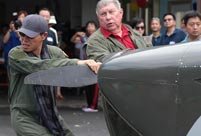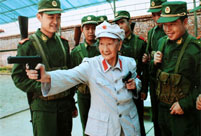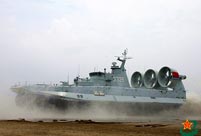

North Korea launched its fifth nuclear test on Sept. 9, in defiance of international guidelines. The test not only violated the international nuclear non-proliferation system, it also threatened regional peace and stability. All parties involved are now forced to deal with the issue in a way that avoids further escalation of tensions.
Nevertheless, Washington once again has put the blame on China, brushing aside the complexity and severity of this issue.
"It's China's responsibility,” U.S. Secretary of Defense Ash Carter claimed at a press conference, adding that China shares responsibility for this development and is duty-bound to reverse it. However, the U.S. has no right to pass the buck and put the blame on other countries, especially when the essence of this issue is a conflict between the U.S. and North Korea.
As the largest neighboring country of the Korean Peninsula, China has committed itself to realizing the denuclearization of the peninsula, safeguarding peace and stability, and resolving roadblocks through dialogues and consultations. How to accomplish these things? By clinging to the big picture of regional security.
China has so far been a team player on this issue, implementing every one of the resolutions adopted by the UN Security Council. After North Korea’s latest nuclear violation, China made a series of proactive diplomatic moves. China will also continue participating in UN Security Council discussions so as to contribute to the final resolution of the issue. Thus, the ongoing assignation of blame to China by the U.S. calls into question whether the U.S. really even wants to find a solution.
After North Korea's fourth nuclear test at the beginning of 2016, the U.S. did its utmost to promote the deployment of a Terminal High Area Altitude Defense (THAAD) system in South Korea. Such a push only escalates tensions on the peninsula and undermines the strategic security interests of the region. Undoubtedly, the U.S. knows that THAAD is not a cure-all solution to the nuclear issue; the country’s insistence on THAAD comes across mostly as an excuse to further its own interests.
In recent years, the U.S. has developed a habit of causing trouble in the international community, and the North Korea nuclear issue is only one example of this behavior.
On the Ukrainian issue, the U.S. refused to honestly assess its own wrongdoing, simply labeling Russia a troublemaker and passing the blame ahead. Besides, the U.S. used the South China Sea issue to protect its hegemony in Asia and contain China, which has been the country’s goal ever since floating the policy of Asia-Pacific Rebalance. On one hand, the U.S. calls itself a guardian of rules, but on the other hand keeps instigating conflicts and pointing fingers at China.
All in all, the U.S. has not only violated fundamental morals, but also made it harder to resolve a number of important issues. What the U.S. should keep in mind about North Korea is that speculation on the nuclear issue is risky, and neglecting the big picture will only aggravate tensions.
Given the current state of the Korean Peninsula, all parties must examine the big picture and take prudent actions to avoid further escalation. The U.S., too, should seriously consider practical solutions and shoulder its due responsibility.
This article is edited and translated from 人民日报钟声:朝核问题,美国不是局外人和裁判官
 Home-made plane completes test flight in Chicago
Home-made plane completes test flight in Chicago The untold stories of women in the Long March
The untold stories of women in the Long March Female soldiers on Frigate Jingzhou
Female soldiers on Frigate Jingzhou Top 10 most beautiful Chinese athletes in Rio
Top 10 most beautiful Chinese athletes in Rio Shenzhen seizes 549 tons of illegally smuggled clothing
Shenzhen seizes 549 tons of illegally smuggled clothing Chinese actor Wang Baoqiang divorces wife, fires manager
Chinese actor Wang Baoqiang divorces wife, fires manager Hangzhou: host city of G20 Summit
Hangzhou: host city of G20 Summit New hovercrafts debut in landing exercise
New hovercrafts debut in landing exercise Woman sets Guinness World Record with 17-month-long pregnancy
Woman sets Guinness World Record with 17-month-long pregnancy Top 10 livable Chinese cities
Top 10 livable Chinese cities Top 20 hottest women in the world in 2014
Top 20 hottest women in the world in 2014 Top 10 hardest languages to learn
Top 10 hardest languages to learn China’s Top 10 Unique Bridges, Highways and Roads
China’s Top 10 Unique Bridges, Highways and Roads Sino-Russian drills show mutual support
Sino-Russian drills show mutual support Protecting panda habitats involves planting bamboo, lifting neighbors out of poverty
Protecting panda habitats involves planting bamboo, lifting neighbors out of poverty Men from different cultures share their tips, tricks and struggles when trying to pick up women
Men from different cultures share their tips, tricks and struggles when trying to pick up women Muslims celebrate Corban Festival in Beijing
Muslims celebrate Corban Festival in Beijing